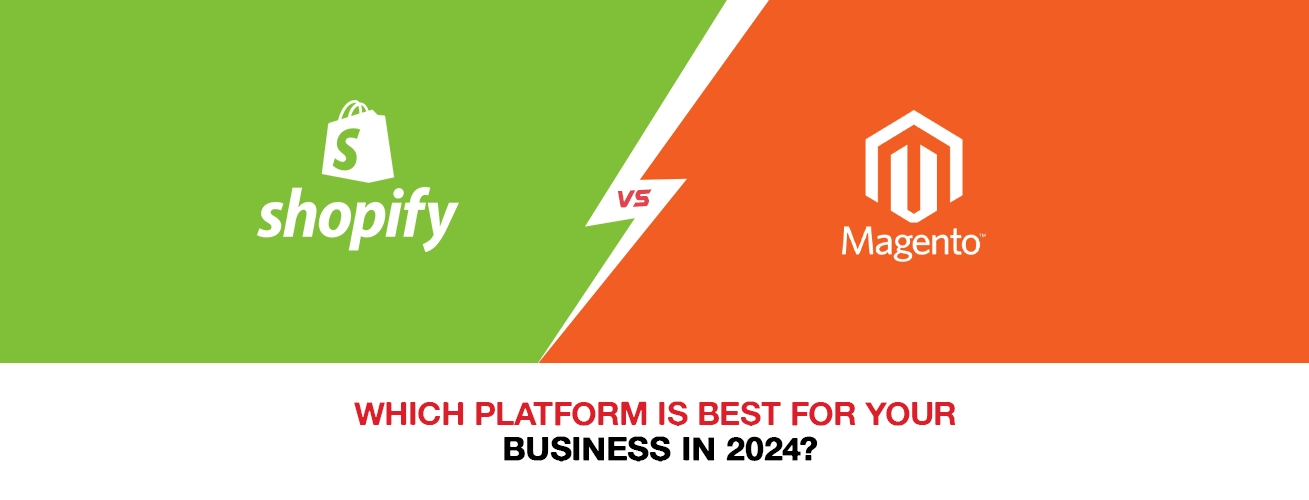Shopify vs. Magento — Which Platform Is Best for Your Business in 2024?
There is no denying that eCommerce is now the future of commerce and trade. Backed by rapid technological innovations, advancements, and shocks generated by COVID-19, eCommerce growth is spectacular. It is growing at 10.4%, and global retail eCommerce sales are expected to reach $6.3 trillion worldwide in 2024.
Therefore, it is no surprise at all that all businesses are jumping on the bandwagon and offering services and goods online. They want to entice more than 5 billion internet users who are engaging in the eCommerce trade. What tools do they have to meet that end? A feature-rich, performance-, and SEO-optimized online store is the key to materializing this business objective. But how can companies and firms build such online stores? eCommerce platforms are the answer.
When it comes to building and operating an online store, two names pop up again and again: Magento, Adobe Commerce, and Shopify. In terms of market shares, internet presence, and the number of merchants who are using them, these eCommerce giants have no parallel. Businesses, no matter how small or large, use either of them to grow their online sales and ensure a unique branded presence.
But when both of them offer cutting-edge and advanced features and capabilities, many businesses cannot decide which eCommerce platform is better. Shopify vs Magento becomes a dilemma and a serious cause of confusion, particularly for beginners. In this blog, we will be comparing these eCommerce platforms based on key criteria so that you can make an informed decision.
Are you ready? Here is a comprehensive comparison.
But first, we look at Magento and Shopify briefly and see what possible pros and cons each platform has for its potential users.
Shopify:
Shopify is a hosted solution that is used by businesses and firms to create and manage their online stores. Known for its user-friendliness, and wide-ranging customization templates, Shopify is a leading eCommerce solution worldwide. As a thumb rule, Shopify is used for medium- and small-sized organizations.
Shopify Plus is an advanced plan for businesses with large enterprise needs and high growth rates, it has all the capabilities of Shopify in addition to more advanced capabilities and functionalities.
Pros of Shopify:
- It features a first-party POS system, offering more than 6,000 integrations.
- It is easy to use, therefore, small firms and startups prefer this platform for building performance-optimized websites and online stores.
- Shopify comes with an impressive set of marketing features, including abandoned cart recovery, multi-currency selling support, and more.
- It has a great number of SEO features and built-in support for SEO tools such as Yoast.
- Shopify Payment allows transactions without any transaction fees.
Cons of Shopify eCommerce Platform:
- If you are using a third-party payment gateway, you will be charged a transaction fee.
- The restriction on three options per product also sometimes becomes frustrating.
- Shopify Payment is not available universally; it is available in a limited number of countries. Likewise, the multi-currency selling option is also not available worldwide.
- Theme customization is limited, which makes it harder for companies to build and maintain a unique branded presence online.
Magento:
With a 13% market share and 270,000 merchants, Magento is a tough challenger to Shopify. Shopify vs Magento has always been an unending debate in the tech world. Magento is an open-source eCommerce platform, that is used by a great number of big-small businesses for building online stores.
Magento eCommerce development offers many benefits to end users as well as to eCommerce solution providers. With a robust set of features for managing products, orders, and payments, as well as rich customization capabilities and extension development features, Magento is a leading eCommerce platform currently available.
Similar to Shopify, Magento also has pros and cons, some of which are discussed below:
Pros of Magento or Adobe Commerce:
- Magento is known for scalability, customization, and a greater degree of flexibility.
- The Magento community is large, dynamic, and readily available for help.
- SEO and marketing features are added advantages of Magento.
- It is capable of supporting wide-ranging product types.
- The management feature, multi-language support, and multi-currency support are also available.
- The checkout is optimized and mobile-friendly.
- The transaction is free of charge.
Cons of Magento:
- If you are looking for an advanced plan, they are very expensive.
- Coding skills are required for theme and template development.
- Businesses need to buy hosting and domains separately, which adds to the overall cost.
- Magento does not have built-in support for social media-based selling.
Now, we come to our main point of discussion: which platform is better for your business?
Shopify vs Magento: Comparison Based upon Key Criteria:
We will compare these two eCommerce giants comprehensively based on the following benchmarks:
- Features
- Pricing and Plans
- Marketing and SEO
- Reporting & Analytics
- Extensions, plug-ins and Apps
#01: Features and Capabilities:
Features are determinant factors in selecting an eCommerce platform. Both Shopify and Magento are known for offering an extensive set of capabilities.
Magento:
Magento offers an impressive suite of advanced and cutting-edge features. Some of the many features are discussed below.
- Instant checkout for a quick and convenient checkout process.
- Payment processing, offering integration with more than 300 payment gateways, including PayPal.
- The extensive set of add-ons enables users to add capabilities with the help of 4500 add-ons and extensions.
- Reporting and analytics help users create and edit reports and gain market insights for better marketing campaigns.
Shopify:
The breadth of features that Shopify offers is also a phenomenon. Some highlighted features are listed here.
- Abandoned cart recovery improves conversion rates by automatically sending emails to customers with their abandoned carts.
- The Mobile App of Shopify gives users the flexibility to manage products and orders while on the go.
- Advanced marketing and SEO tools help users improve sales through social media integration, discounts, special offers, and more.
- The Shopify App Store is another major feature, offering more than 700 apps for enhancing the functionalities of online stores.
Winner:
In terms of features included, Shopify wins narrowly the Shopify vs Magento fight.
#2: Pricing and Plans:
Needless to say, pricing is one of the most important factors that contributes to the final decision. The features of both Magento and Shopify are comparable, but they differ sharply when it comes to pricing and plans.
Magento: Pricing and Plans:
On face value, Magento is free to download and install, it seems very cost-effective. But you will need to purchase a separate domain and hosting provider.
In addition, you may need integrations to your websites for improved capabilities. These integrations are available on the Magento App Market and may cost you up to $15,000.
Magento is available in three editions: Magento Open Source, Adobe Commerce, and Adobe Commerce on Managed Services. Prices of Adobe Commerce and Managed Services are not fixed, it would be determined by the total sale volumes of your store.
You will also bear expenditures for, besides hosting and domain names, SSL certificates, web design costs, SEO and digital promotion, Magento 2 development costs, and payment provider fees.
All these essential services and products would add up and incur a significant expenditure for running and maintaining Magento-based online stores.
Shopify: Pricing and Plans:
Unlike Magento, Shopify is a subscription-based eCommerce platform. It offers three plans that cost between $19 per month for Shopify Basic to $299 per month for Shopify Advanced. All editions cover hosting and domain fees; therefore, you don’t need to worry about purchasing them.
The themes and extensions that Shopify offers are also affordable and comparatively cheaper in comparison with Magento.
Winner:
In terms of pricing, Shopify is a clear winner. It provides an affordable platform for new merchants and startups to launch their online stores without purchasing domain names and hosting providers. Moreover, apps, templates, and extensions that Shopify offers are also cheaper.
#3: Extensions/Plug-ins and Apps:
Extensions and applications are critical for enhancing the functionalities of online stores. They are used to make the checkout process more manageable and more streamlined and for countless other ends. Both Magento and Shopify feature thousands of applications and plugins for this end.
Magento:
Magento offers more than 3800 extensions available on the Magento marketplace. Installation of these plugins demands coding skills that add further to online store maintenance and upgrades.
Shopify:
The Shopify App Store features more than 8000 extensions. These extensions are both free and paid. You can use them for various ends such as marketing, SEO, and social media selling, among others.
For instance,
- PageFly extension is used for website building
- AvadaSEO can be used to further improve the efficiency of SEO campaigns
Winner:
In this round of the Shopify vs Magento fight, Shopify is a winner because of a higher number of extensions for adding multiple features to your eCommerce store.
#4: Marketing and SEO Support:
Marketing and SEO are key to running a successful eCommerce business. If you don’t run a digital marketing campaign, you are set to doom, there is no denying that. Both Magento and SEO support marketing directly or indirectly, their performance is hereby discussed.
Magento:
First things first, Magento does not have built-in support for SEO and marketing. Businesses need to install extensions for various aspects of marketing such as advertising, email marketing, CMS, SEO, and more.
There are more than 400+ extensions available for this end. But you need technical expertise and knowledge to properly install and exploit these marketing and SEO extensions.
Shopify:
Shopify features built-in marketing support. It has a marketing dashboard where you can find Key Performance Indicators (KPIs), top marketing channels, and more.
You can perform marketing tasks such as adding keywords, optimizing sites, and submitting sitemaps for improving SEO campaigns.
Moreover, you can synchronize your products with Google Merchant Center, allowing you to display your products in Google Shopping.
Winner:
By dint of built-in support for marketing and SEO, Shopify is again a clear winner here.
#05: Reporting & Analytics:
Reporting and Analytics are key features to track the performance of online stores and measure the outcomes of SEO and other digital marketing campaigns. Therefore, comparing Shopify and Magento is important here.
Magento:
The reporting and analytics feature of Magento depends upon its version, integrations, and extensions. For instance, Magento 2 or Adobe Commerce features Sales and Customer Tracking and Review Tracking.
You can also integrate your online store with Google Analytics 4 for accessing better reporting and analytics tools.
Shopify:
Shopify, on the other hand, offers a wide range of reporting and analytics tools, enabling users to gain insights into market trends, customers’ behavior, and sales trends.
It features Shopify Analytics Dashboard where you can access reports and Live View. Furthermore, you can also integrate your online store with Google Analytics.
Winner:
Based on reporting and analytics benchmarks, both Shopify and Magento perform fairly well. Therefore, businesses can rely on both of them for better market and sales analytics.
Final Thoughts:
In conclusion, both Magento and Shopify perform exceptionally well on many benchmarks. Both have weaknesses as well as strengths that businesses must bear in mind while making a final decision. Shopify is a platform of choice for small businesses because it is cost-effective, easy to use, and has built-in marketing and analytics capabilities.
Magento, on the other hand, is a preferred choice for large organizations and corporations because it offers extensive customization options, advanced security features, and a greater degree of scalability to cope with expanding business needs.
We do hope that this brief but comprehensive comparison will go a long way in helping you make an informed decision and clearing confusion surrounding the Shopify vs Magento debate.





